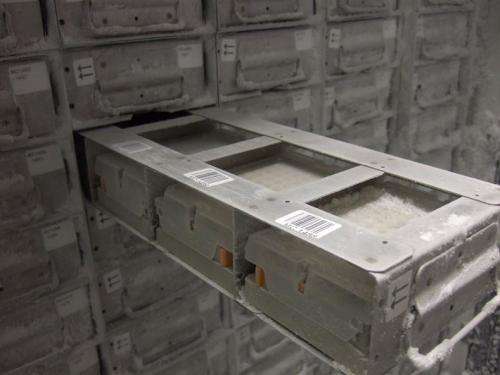Motor neurone disease association opens Manchester-based global DNA bank

A specialist DNA Bank, based at The University of Manchester, is now open to the worldwide research community, supporting more crucial discoveries about motor neurone disease (MND), a devastating terminal illness.
The cause of MND is thought to be a combination of subtle genetics, lifestyle and environmental factors. A small but growing number of these genetic factors are known, but to help this vital area of research the Motor Neurone Disease Association began the UK MND DNA Bank in 2003.
Co-ordinated by the three participating MND Care Centres (King's College London, Sheffield and Birmingham) a multicentre collaboration across the UK invited people living with MND to participate in research by giving a blood sample.
By the end of 2011 more than 3,000 samples had been banked from people living with MND in the UK, their family members and also samples from healthy participants to work as a control in research studies.
Dr Belinda Cupid, Head of Research at the MND Association, said: "It's a fantastic and high quality international research resource and exists thanks to people with MND, their families and the team of neurologists and nurses around the country who helped collect the samples."
Colin Fenwick and his wife Alison both gave blood samples for the DNA Bank in 2011. Colin, 49, from Macclesfield said: "I had a formal diagnosis of MND at the end of 2010 and am lucky in that I have a fairly slow progression of the disease. I have not lost my voice although my arms and legs are weak.
"My wife and I both have a scientific background (in molecular genetics and geochemistry respectively) so take an interest in research and are also always keen to get involved in any project that will help research of MND. It is exciting that we have helped contribute to such a major resource for researchers and that it is now accessible from anywhere in the world."
Jennie Pierce from Congleton, in Cheshire gave a blood sample in 2011 together with husband Pete, who is living with MND. She said: "We both felt very strongly that it was something we wanted to take part in. We always knew it would not do Pete any good but you have to look to the future.
"With grandchildren it is important to us to do everything we can to try and support finding out more about MND in any way we can. Pete doesn't have the familial form of MND but there is still so much more to be known about the disease that makes this DNA Bank vital."
Professor Stuart Pickering-Brown, from The University of Manchester's Institute of Brain, Behaviour and Mental Health, said that the new UK MND DNA bank would be useful for scientists across the country.
Professor Pickering-Brown's research focuses on a common form of dementia, known as frontotemporal dementia, which is related to MND and two years ago he was part of an international consortium of researchers who discovered a rogue gene which can cause both frontotemporal dementia and MND.
He said: "DNA collections like this are absolutely vital to allow scientists like me to continue to make breakthroughs and developments in the study of MND and frontotemporal dementia which can help inform patient care.
"This will be the biggest collection of DNA samples gifted by donors with MND in the country. The University of Manchester has no doubt been chosen because within The Centre for Integrated Genomic Medicine we have the biobanking infrastructure, such as robotic platforms in place to effectively manage the samples.
"DNA banks allow scientists to explore the mechanisms at play within a patient's DNA and how a particular gene can lead to some people getting MND disease and others getting dementia. What discovering the gene has not told us is how this comes about and this is what my research is now exploring."













